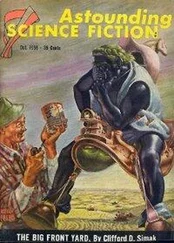But a billion years, he thought, is a long, long time.
He reached the junkyard and walked its familiar ground, dodging the larger pieces of machinery that lay all about, stumbling on one or two of the smaller pieces that lay unseen in the darkness.
The second time he stumbled, he stooped and picked up the thing he had stumbled on and it was, he knew, one of the tools that the alien race had left behind them when they fled. He could picture them, dropping their tools and fleeing, but the picture was not clear. He could not decide what these aliens might have looked like or what they might have fled from.
He tossed the tool up and down, catching it in his hand. It was light and handy and undoubtedly there was some use for it, but he did not know the use nor did any of the others up there in the ship. Hand or tentacle, claw or paw – what appendage had it been that had grasped the tool? What mind lay behind the hand or tentacle, claw or paw that had grasped and used it?
He stood and threw back his head and looked at the stars that shone above the planet and they were not the familiar stars he had known when he was a child.
Far out, he thought, far out. The farthest out that Man had ever been.
A sound jerked him around, the sound of running feet coming down the trail.
“Warren!” cried a voice. “Warren! Where are you?”
There was fright in that voice, the frantic note of panic that one hears in the screaming of a terrified child.
“Warren!”
“Here!” shouted Warren. “Over here. I’m coming.”
He swung around and hurried to meet the man who was running in the dark.
The runner would have charged on past him if he had not put out a hand and gripped him by the shoulder and pulled him to a halt.
“Warren! Is that you?”
“What’s the matter, Mac?” asked Warren.
“I can’t … I can’t … I …”
“What’s wrong? Speak up? You can’t what, Mac?”
He felt the engineer’s fumbling hands reaching out for him, grasping at his coat lapels, hanging onto him as if the engineer were a drowning man.
“Come on, come on,” Warren urged with the impatience of alarm.
“I can’t start the engines, sir,” said Mac.
“Can’t start the …”
“I can’t start them, sir. And neither can the others. None of us can start them, sir.”
“The engines!” said Warren, terror rising swiftly. “What’s the matter with the engines?”
“There’s nothing the matter with the engines. It’s us, sir. We can’t start them.”
“Talk sense, man. Why can’t you?”
“We can’t remember how. We’ve forgotten how to start the engines!”
VI
Warren switched on the light above the desk and straightened, seeking out the book among the others on the shelf.
“It’s right here, Mac,” he said. “I knew I had it here.”
He found it and took it down and opened it beneath the light. He leafed the pages rapidly. Behind him he could hear the tense, almost terrified breathing of the engineer.
“It’s all right, Mac. It’s all here in the book.”
He leafed too far ahead and had to back up a page or two and reached the place and spread the book wide beneath the lamp.
“Now,” he said, “we’ll get those engines started. It tells right here …”
He tried to read and couldn’t.
He could understand the words all right and the symbols, but the sum of the words he read made little sense and the symbols none at all.
He felt the sweat breaking out on him, running down his forehead and gathering in his eyebrows, breaking out of his armpits and trickling down his ribs.
“What’s the matter, Chief?” asked Mac. “What’s the matter now?”
Warren felt his body wanting to shake, straining every nerve to tremble, but it wouldn’t move. He was frozen stiff.
“This is the engine manual,” he said, his voice cold and low. “It tells all about the engines – how they operate, how to locate trouble, how to fix them.”
“Then we’re all right,” breathed Mac, enormously relieved.
Warren closed the book.
“No, we aren’t, Mac. I’ve forgotten all the symbols and most of the terminology.”
“You what?”
“I can’t read the book,” said Warren.
VII
“It just isn’t possible,” argued Spencer.
“It’s not only possible,” Warren told him. “It happened. Is there any one of you who can read that book?”
They didn’t answer him.
“If there’s anyone who can,” invited Warren. “Step up and show us how.”
Clyne said quietly, “There’s none of us can read it.”
“And yet,” declared Warren, “an hour ago any one of you – any single one of you – probably would have bet his life that he not only could start the engines if he had to, but could take the manual if he couldn’t and figure how to do it.”
“You’re right,” Clyne agreed. “We would have bet our lives. An hour ago we would have. It would have been a safe, sure bet.”
“That’s what you think,” said Warren. “How do you know how long it’s been since you couldn’t read the manual?”
“We don’t, of course,” Clyne was forced to admit.
“There’s something more. You didn’t find the answer to the junkyard. You guessed an answer, but you didn’t find one. And you should have. You know damn well you should have.”
Clyne rose to his feet. “Now see here, Warren …”
“Sit down, John,” said Spencer. “Warren’s got us dead to rights. We didn’t find an answer and we know we didn’t. We took a guess and substituted it for the answer that we didn’t find. And Warren’s right about something else – we should have found the answer.”
Under any other circumstances, Warren thought, they might have hated him for those blunt truths, but now they didn’t. They just sat there and he could see the realization seeping into them.
Dyer finally said, “You think we failed out there because we forgot – just like Mac forgot.”
“You lost some of your skills,” replied Warren, “some of your skills and knowledge. You worked as hard as ever. You went through the motions. You didn’t have the skill or knowledge any more, that’s all.”
“And now?” asked Lang.
“I don’t know.”
“This is what happened to that other ship,” said Briggs emphatically.
“Maybe,” Warren said with less conviction.
“But they got away,” Clyne pointed out.
“So will we,” promised Warren. “Somehow.”
VIII
The crew of that other, alien ship had evidently forgotten, too. But somehow or other they had blasted off – somehow or other they had remembered, or forced themselves to remember. But if it had been the simple matter of remembering, why had they rebuilt the engines? They could have used their own.
Warren lay in his bunk, staring into the blackness, knowing that a scant two feet above his head there was a plate of steel, but he couldn’t see the steel. And he knew there was a way to start the engines, a simple way once you knew it or remembered it, but he couldn’t see that, either.
Man experienced incidents, gathered knowledge, knew emotion – and then, in the course of time, forgot the incident and knowledge and emotion. Life was a long series of forgettings. Memories were wiped out and old knowledge dulled and skill was lost, but it took time to wipe it out or dull it or lose it. You couldn’t know a thing one day and forget it on the next.
But here on this barren world, in some impossible way, the forgetting had been speeded up. On Earth it took years to forget an incident or to lose a skill. Here it happened overnight.
Читать дальше












